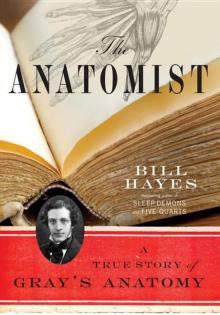The Anatomist: A True Story of Gray's Anatomy 

by Bill Hayes
Genre: Other10
Published: 2008
View: 2114
Read OnlineRead The Anatomist: A True Story of Gray's Anatomy Storyline:
The classic medical text known as Gray’s Anatomy is one of the most famous books ever written. Now, on the 150th anniversary of its publication, acclaimed science writer and master of narrative nonfiction Bill Hayes has written the fascinating, never-before-told true story of how this seminal volume came to be. A blend of history, science, culture, and Hayes’s own personal experiences, The Anatomist is this author’s most accomplished and affecting work to date.With passion and wit, Hayes explores the significance of Gray’s Anatomy and explains why it came to symbolize a turning point in medical history. But he does much, much more. Uncovering a treasure trove of forgotten letters and diaries, he illuminates the astonishing relationship between the fiercely gifted young anatomist Henry Gray and his younger collaborator H. V. Carter, whose exquisite anatomical illustrations are masterpieces of art and close observation. Tracing the triumphs and tragedies of these two extraordinary men, Hayes brings an equally extraordinary era–the mid-1800s–unforgettably to life.But the journey Hayes takes us on is not only outward but inward–through the blood and tissue and organs of the human body–for The Anatomist* *chronicles Hayes’s year as a student of classical gross anatomy, performing with his own hands the dissections and examinations detailed by Henry Gray 150 years ago. As Hayes’s acquaintance with death deepens, he finds his understanding and appreciation of life deepening in unexpected and profoundly moving ways.The Anatomist is more than just the story of a book. It is the story of the human body, a story whose beginning and end we all know and share but that, like all great stories, is infinitely rich in between.From Publishers WeeklyAt 150 years old, Gray's Anatomy still sets the standard in medical textbooks, yet little has been written about its author, Henry Gray. Even less celebrated is Henry Carter, the illustrator who brought Gray's groundbreaking anatomy text to life. Hayes (Sleep Demons: An Insomniac's Memoir) explores the lives of these two men, balancing biographical chapters with his own experience in the anatomy classroom, dissecting cadavers and marveling at each new discovery with prose both lucid and arrestingly beautiful: Like a pomegranate, whose leathery rind belies its jewel box interior, the kidney is spectacular inside. From Carter's diary entries, Hayes recreates an era when medical advances were rapidly changing the way people lived as well as challenging religious dogma, and people turned to science in hopes of reconciling the two. Hayes finds emotional resonance in Carter's longing for a job that would matter, as well as in his internal conflicts as a Protestant Dissenter and his fear of professing his despised beliefs in public. As Hayes relates his own growing wonder and respect for anatomy, one feels the echo of Carter and Gray's devotion as they worked to create what one historian called an affordable, accurate teaching aid. Hayes pays eloquent tribute to two masterpieces: the human body and the book detailing it. (Dec. 26) Copyright © Reed Business Information, a division of Reed Elsevier Inc. All rights reserved. From The New YorkerHayes’s history of the illustrated medical text "Gray’s Anatomy" coincides with the hundred-and-fiftieth anniversary of its first publication. Fascinated by the fact that little was known about the famous book’s genesis, Hayes combed through nineteenth-century letters and medical-school records, learning that, besides Henry Gray, the brilliant scholar and surgeon who wrote the text, another anatomist was crucial to the book’s popularity: Henry Vandyke Carter, who provided its painstaking drawings. Hayes moves nimbly between the dour streets of Victorian London, where Gray and Carter trained at St. George’s Hospital, and the sunnier classrooms of a West Coast university filled with athletic physical therapists in training, where he enrolls in anatomy classes and discovers that "when done well, dissection is very pleasing aesthetically." Copyright © 2007 Click here to subscribe to The New Yorker"All laud and honor to Hayes....In perusing the body's 650 muscles and 206 bones, he has made the case that we are, as the psalmist wrote, "fearfully and wonderfully made" and that dissection has an aesthetic all its own. The act of carving open a body becomes, in this context, a perverse act of love, a desecration that consecrates "the extraordinary, the inner architecture of the human form." - The Washington Post"How do you write a book about someone about whom next to nothing is known? For most writers, the answer would be move on to the next subject. But Bill Hayes has an unusual set of skills. The author of previous books on insomnia and blood, he is part science writer, part memoirist, part culture explainer. “The Anatomist,” his appealing new book about the man behind Gray’s Anatomy, combines his search for the remaining traces of Henry Gray with a memoir of his own experience as a dissection student and a scalpel’s-eye tour of the body." - The New York Times"Some of [Hayes's] most memorable writing describes the dissection classes he attended in San Francisco. We are treated to a selection of fascinating anatomical snippets about, for example, how to trace evidence of the sealed hole in the fetal heart through which the mother's blood enters; or how to find the kidney in a cadaver; or that blood flowing out of the heart is first used to feed the heart itself; or, best of all, a structural analysis of how the Queen manages to deliver such a uniquely restrained wave." -Nature: The International Weekly Journal of SciencePages of The Anatomist: A True Story of Gray's Anatomy :